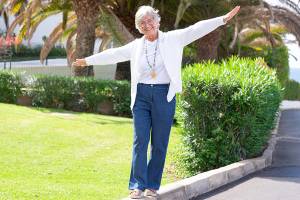By Marie B. Fish
“You shouldn’t read so much. You’ll only go blind that much sooner,” was a warning members of my family would give me.
This only served to make me read more voraciously than ever while I could still see. When I was fourteen Father Butler, the priest who baptized me, invited me and my younger siblings to attend the local parochial school. He was in the habit of finding Catholic families who lived on the wrong side of the tracks, inviting them to attend “his school” and, obviously, was able to persuade wealthy Catholics to pick up the expense.
We weren’t aware that it cost money to go to a private school. We were accustomed to the free public school system. I was anxious to learn my religion, so I was happy to accept his invitation. The Sisters must have told him that my brother, Charley, and I were having difficulty seeing the blackboard because he made arrangements for us to go to the best eye doctor in town.
“What’s your problem?” this doctor asked me.
“I can’t see,” I explained.
He put me through a series of tests then said, “No wonder you can’t see. You’re blind.”
Well, not completely. I could see blurred images well enough that I hadn’t run into any doors or walls. So Charley and I received glasses, free of charge. I walked outside and was amazed to see all the buildings had clearly defined corners!
Those glasses were precious and I guarded them carefully. I put them in a safe place when I went to bed at night. I put them on first thing in the morning and only removed them when I was in the shower. Furthermore, I never understood anyone who lost or misplaced their glasses. Mine became a permanent part of my face.
This worked well for almost sixty years. My eye doctor checked my vision on a sort of regular basis, upgrading the lens whenever necessary.
I began to develop cataracts. I knew several people who had surgery to remove their cataracts, but I had never inquired about the details of what might be involved. Now I had to think about what was involved and what might be the result.
I had not been concerned about other surgeries; not the cesarean section to deliver a baby, not the tonsillectomy, gall bladder, thyroid… none of these worried me. I had even had all of my teeth pulled… yeah, that was painful, but not terribly worrisome.
When the doctor said it was time to schedule surgery, I picked up a brochure to see exactly what was involved. I called my brother, Charley.
“Oh, yes,” he said. “I had it done a few years ago. I wish I’d had it done sooner.”
There were discussions with the doctor and his staff. There was a film to demonstrate and explain the details. I tried to be casual about it. I told my daughter she could just drop me off and go to work as I had been warned I wouldn’t be able to drive afterward. “They insist I have to have someone to drive me home,” I apologized.
“It’s okay,” she said. “I can stay with you.”
They put drops in the eye, and we waited while that took effect. They prepped me with sufficient anesthesia to make me relax. The actual surgery took maybe fifteen or twenty minutes.
I was very glad to have Cristina drive me home. The next morning, I appreciated her insistence on driving me back to have the bandage removed and receive instructions for taking care of it. It wasn’t painful, but I was reminded that the eye had to heal.
Three weeks later, I had the cataract removed from the other eye. When my son said he would take the day off to be with me, I didn’t argue. For the first time in sixty-four years, I left my glasses at home.
With the left eye bandaged, I could read words on the television from twelve feet away. Amazing! I picked up the newspaper and it was blurred! I had always been near-sighted, so this was a change. My sight was not perfect. I was going to need reading glasses.
Reminder to self: the purpose of the surgery to remove the cataracts was to prevent my losing my sight entirely, not to improve it to the point to where I no longer need glasses at all.
Not a bad deal. MSN









